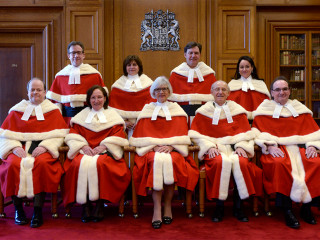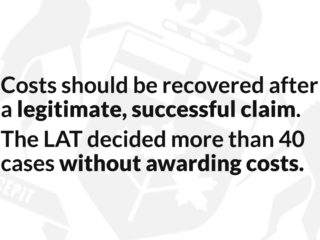This six-week jury trial involved a plaintiff who sustained a mild traumatic head injury after a fall down stairs at the defendant’s premises. The jury awarded $3.7M in damages, including approximately $975,000 in future care costs. The jury assessed contributory negligence at 5% for failing to hold the handrail.
Background
On January 2, 2015, the plaintiff attended at the defendant’s community centre with her spouse. As the plaintiff descended a set of stairs, her toe got caught on a partially detached piece of anti-slip tape on one of the steps, causing her to trip and fall down the stairs and land on her head. The plaintiff was not holding the handrail. The plaintiff suffered a concussion/mild traumatic brain injury(mTBI), which resulted in significant cognitive impairments that impacted her career as a lawyer with the federal government as well as her ability to function on a day-to-day basis.
As a consequence of the mTBI, the plaintiff suffered from physical and emotional symptoms of post-concussion syndrome, specifically headaches, mood swings, irritability, fatigue and sensitivity to light and noise. Her cognitive impairments had the most devastating impact upon her functioning and included significant deficits in short-term memory, concentration, multi-tasking, decision-making, attention, and information processing.
The plaintiff was highly motivated to return to work despite her cognitive deficits. Prior to the accident, the plaintiff was a “rising star” in the DOJ and there were high expectations upon her to reach the highest echelons of the department. The plaintiff took months of leave and then participated in a gradual return to work program. Despite these efforts, the plaintiff was never able to meet the cognitive demands of her role as a lawyer. In an attempt to continue working, the plaintiff took secondments into less cognitively demanding non-legal positions over a period of approximately three years. The plaintiff continued to struggle in these positions and was propped up by the unsustainable assistance of others who also hoped that her previous abilities would return.
Unfortunately, her cognitive functioning did not improve. At the age of 52, the plaintiff was placed on long-term disability and eventually was granted a medical retirement. The defendant took the position at trial that the plaintiff’s return to employment was evidence that she had improved cognitively. After learning of the plaintiff’s stoppage of work, the defence neuropsychologist, Dr. Kim Payne, reassessed the plaintiff and changed her previous diagnosis of mTBI to make an alternate diagnosis. Notwithstanding that the factual foundation of Dr. Payne’s alternate diagnosis was undermined in cross-examination and Dr. Payne’s diagnosis was rejected by the defence’s own neurologist, the defence continued to advance Dr. Payne’s diagnosis in support of a “crumbling skull” defence. It was soundly rejected by the jury. Ultimately, the defence position that there was no cognitive decline at the time of work stoppage was rebutted by the evidence of the plaintiff’s supervisor and co-workers as well as the evidence of her spouse, her friends and her family doctor.
Trial Evidence re: Damages
The plaintiff had difficulties following conversations, expressing herself verbally and in writing, remembering information from one day to the next, word-finding, following a recipe and even playing card games. While she was able to continue to physically participate in many recreational activities after the accident, they were not to the level she was able to engage prior to the accident. Moreover, since the fall, the plaintiff had been heavily reliant on her spouse for daily assistance and support, including prompting, cueing, reminders, organization, scheduling, meal preparation, shopping and financial and household administration tasks. The fall had a significant impact on the plaintiff’s relationship with her spouse which changed from an equal partnership to one of dependence and reliance. The plaintiff’s spouse was referred to as her external “hard drive”.
With respect to the plaintiff’s future income loss, the plaintiff was on upward career trajectory prior to the fall. Since starting with the federal government, the plaintiff advanced quickly to the level of LP-3 in less than 10 years. The plaintiff’s own supervisor testified that she had no doubt that the plaintiff would surpass her own level and achievements within the federal government. Additional evidence from the plaintiff’s colleagues further supported the fact that the plaintiff was an exceptional lawyer, with all of the skills and knowledge necessary to receive further promotions in her career, had the fall not occurred.
Verdict
In their verdict, the jury found the defendant failed to take reasonable care to ensure the safety of the plaintiff while on their premises, and that this failure was a cause of the plaintiff’s fall.
In concluding that the defendant failed to take reasonable care, the jury found that the anti-slip tape used by the defendant did not meet the standards/specifications required under the Ontario Building Code, and that the applications identified by the manufacturer of the anti-slip tape did not include use on stairs. Additionally, the jury concluded that the defendant did not have a regularly scheduled and documented maintenance/inspection plan to ensure the safety of the stairs.
In apportioning liability, the jury determined that the defendant was 95% at fault for the fall, and found the plaintiff 5% contributorily negligent for failing to utilize the available handrails. With respect to damages, the jury assessed the plaintiff’s overall damages at a total of $3,707,462.97, excluding PJI and costs. This amount included $216,000 in general damages and $85,000 in FLA damages. In addition, the jury awarded approximately $975,000 in future care costs which include approximately $635,000 for personal support services to replace the services which are currently provided by the plaintiff’s spouse.
The income loss was assessed by the jury in amounts which recognize that the plaintiff would have received two promotions to the LP-5 level (the highest level for Law Practitioner) within five years had the fall not occurred.
The following experts were called for the plaintiff: Dr. Donald Cameron (neurologist from BC), Dr. James Schmidt (neuropsychologist from BC – no relation to Dr. Darren Schmidt of Ontario), Carol Bierbrier (Life Care Planner), Gary Principe (Economic Loss expert) and Gord Jenish (Jenish Engineering). The defence relied upon Dr. Kim Payne (neuropsychologist), Dr. George Medvedev (neurologist from BC), Gerald Kerr (OT from BC), Mr. Sam Kodsi (Kodsi Engineering – although his evidence was ultimately expunged from the record. Mr. Kodsi refused to stick to the contents of his report and insisted on testifying about matters outside of his report even after being cautioned twice by the trial judge.), Gary Phelps (Davis Martindale) and Dr. Andrew Huntley (Bio-Mechanics – 30 Forensics).
Plaintiffs’ counsel, all OTLA members, were Joseph Obagi, Elizabeth Quigley and Cody Watson. The defence was represented by Tara Lemke and Alex Herle.













